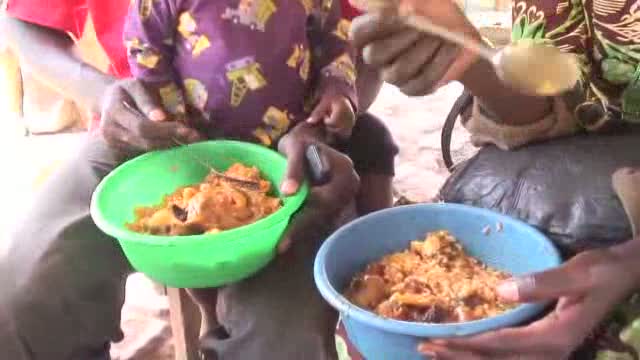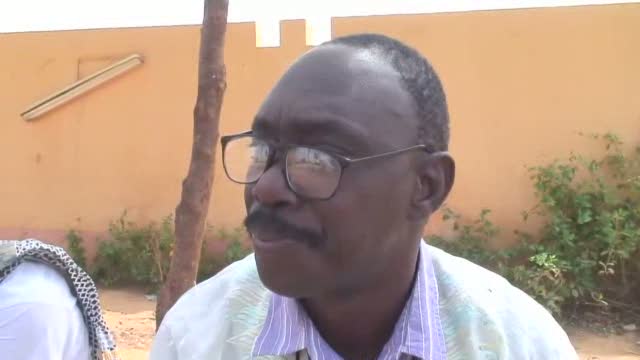Refugees Magazine Issue 106 (Focus : 1996 in review) - M'Berra: A victim of its success
Refugees Magazine, 1 December 1996
M'Berra camp in Mauritania is emptying fast. Thousands of Malian refugees fled the violence and repression in the north of the country in the early 1990s. But now that peace has returned, the refugees are heading back to Mali.
By Randall Koral
The pilot said we were directly above M'Berra camp. I looked out, expecting a field of blue-capped tents to rise suddenly and dramatically out of the Sahara. I saw only an arid expanse of brown, shimmering in the heat-haze.
The pilot manoeuvered the plane through a few slow circles, but it wasn't much help. I could barely tell where the desert ended and the camp began. I wasn't worried, though. M'Berra and I would get to know each other.
At the time of my visit in October, at the beginning of the dry season, there were just under 28,000 refugees living in this remote corner of Mauritania. They were primarily Malians, of Tuareg and Moor origin, who had fled the fighting that erupted in Mali and Niger in the early 1990s. Tuareg groups, "armed bandits" as they were called officially, had mounted attacks against convoys in the north of Mali. To escape the violence and repression that ensued, thousands of Malians went to neighbouring countries.
There are still 100,000 Malian refugees in four countries: 28,000 in Mauritania, 25,000 in Burkina Faso, 20,500 in Niger and 15,500 in Algeria. But now that peace has returned, the refugees are heading back to Mali.
I had come to M'Berra camp to prepare a documentary on refugees.
Journalists usually do well to shy away from stories with happy endings, especially when there is so much unhappiness to report from Africa. But this was one story that promised to end happily, and I found myself looking forward to telling it. More refugees are going home every day. M'Berra camp may be closed by the time you read this, a victim of its own success.
Since June 1995 more than 14,000 of the refugees who had fled to M'Berra had returned to Mali. The combatants who had turned the north of the country into a war zone now seemed serious about keeping the peace.
They came together in Timbuktu, on 27 March 1996, and threw their weapons onto a bonfire that lit up the night. The message was clear. For all the questions that remained about Mali's future, about the country's ability to pull itself out of devastating poverty, there was now an overwhelming argument for hope.
The first refugees I met at M'Berra were from a place in the desert just west of Léré. Mohammed Ag Hawadan and his family once lived as nomads. They wandered in search of grazing land for their livestock, until the droughts of the early '80s wiped them out. He arrived in Mauritania with his wife, son and three daughters in 1991. Members of his wife's family had been killed by soldiers. At M'Berra camp, Mohammed found work in the camp hospital. When I met him he was spending much of his day going from tent to tent, advising his fellow refugees on medical matters. "What I do is very important," he told me, with evident pride. "Especially making sure that the children receive their vaccinations."
Was he now prepared to go back to Mali? He said he was. The chief of the Tuareg clan to which Mohammed and his family belong had already gone back to the spot near Léré, to prepare the way for the others. "It's another life now," Mohammed explained. "Before, people worked with animals and passed that work tradition down from generation to generation. Now there are no more animals, and schooling has become much more important."
The following day I met a group of slaves who had managed to set themselves free. Even though slavery has been officially outlawed in Mali and Mauritania, the practice continues among certain groups of Moor and Tuareg who draw slaves from, respectively, the Harratin and the Bella populations.
The Bellas I met had arrived in the camp as the "property" of some Tuareg shepherds. When the shepherds decided to go back to Mali, the Bellas refused to accompany them. "We no longer wanted to be attached to someone," explained Alhousseini Ag Goulounbou, the Bella chieftain. "We wanted our independence."
I stayed in M'Berra camp long enough to get to know a few refugee families.
I watched children learn to count in the school. I saw women doing the hardest work – building tents, dying fabric, pounding the millet before sunrise and then starting again as soon as the twilight had cut the day's heat. One of those women told me, "If I have no work, I'll look for something to sew or I'll do some other task so that I'm not idle."
I also got to know a few more people on the UNHCR side of the fence. Paolo Artini is a field officer based in Bassikounou, about 17 km north-west of M'Berra camp. He has the ability to navigate around a refugee camp more comfortably than I can navigate around my kitchen. Better than that, Paolo has an easy rapport with people in general, and with the refugees at M'Berra in particular, and he managed to save me from my own ignorance on more than one occasion.
Paolo has worked as a protection officer in Kuwait and Armenia, but he seems ideally suited to the work that has to be done in a camp situation. He takes an active role in organizing convoys, sometimes driving the trucks, and occasionally he participates in fact-finding missions to repatriation sites.
After I had left M'Berra I crossed paths with Paolo a week later in Timbuktu. He had come there with six refugee leaders – three Moor, three Tuareg – who had wanted to see for themselves what Mali had in store for them. "It isn't like I'm UNHCR staff and they're refugees," Paolo explained. "We all eat together, sitting on the ground. We're just people who came together from M'Berra, and we want to stay together. At one point they thanked me and said, 'You can't know someone if you don't travel with him.'"
I asked Paolo about his future plans. "I'd like to stay in Africa, but the refugees are leaving M'Berra very quickly. The camp will probably be closed by the end of the year."
Source: Refugees Magazine Issue 106 (1996)


















































